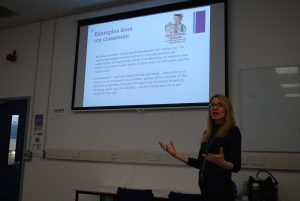CAP Forum: Research-informed curriculum design: successes and challenges
Our most recent CAP Forum focused on research-informed curriculum design. As a recent Research-informed Teaching Award winner, Dr Line Nyhagen took us through some of her wonderful successes and some of the challenges she has faced in four specific innovative teaching practices which were designed to enhance student engagement.
- The first is a field visit to a local mosque in order to allow her students to understand ‘lived religion’, where she emphasised that it is important that the pedagogic intention of any field visit is clear. Previously, there had been no field visits in the Social Sciences Department, and so she sought advice from the Geography department on the basics and reflected on what went well and what she could improve after the first year of running the trip. The trip was very successful; the feedback from participating students was overwhelmingly positive, alongside a post on the department newsfeed talking of its success. However, the main challenge she faced was that the attendance on the trip was quite low. The following year, Line took on board feedback on that particular issue and added organised transport and included an assessment element related to the trip that was worth 10%, which dramatically increased the attendance.
- The second example discussed was a ‘Coursework Topic Approval Forum’ which was used instead of a list of essays from students to select from. It involved students having to use a forum on Learn to get approval and feedback for their coursework title which could be about any topic they were interested in on the module. This fostered the sharing of ideas and allowed transparent formative feedback to be given to all students. Although this had many successes, it generated quite a lot of additional work for Line, and made a small proportion of students uncomfortable. Upon reflection, this year Line has chosen to produce both a list of essay titles and allow students to choose their own titles if they wish, nonetheless they must use the new general coursework forum for any questions related to coursework so that formative feedback continues to be shared among all students. A lot of the discussion afterwards focused on this area and suggested ideas such as having the group as a whole come up with the list of questions and queried why it was online and not in person in a session which was agreed would also work.
- Line also spoke about ‘Memory Work’ as a method to teach gender and other identities, which is a research method she has used in her own research. This encouraged students to see themselves as both the researcher and the research subject, and allowing students to feel an ownership of the material being used to teach as it was generated by themselves. This in turn increased student engagement. This topic also generated lots of questions and discussion about how the technique could be applied to teaching in other areas, for example as an aid to reflecting on group assignments.
- The final topic discussed was her ‘In-class Policy Awareness Event’ which she used as a new technique for increasing student engagement this year. She did this by trying to find topics directly relevant to her students, and this year chose sexual harassment policy due to the recent focus of the NUS on the topic, as well as it being one of her students’ dissertation topics last year. She took the students through the University’s Zero Tolerance policy, conducted research in-class using a quick SurveyMonkey questionnaire with results immediately available in the classroom. She also asked her students to come up with campaign ideas and proposals for increasing awareness, which was an identified problem. As an unintended consequence of this session, Line was able to take these suggestions to the Athena SWAN Team in her the school, which she leads. She has also shared the class findings and policy proposals with the Director of Student Services.
If you have any questions for Line about her experiences please feel free to contact her at l.nyhagen@lboro.ac.uk or take a look at her twitter at @Line_Nyhagen. Alternatively, if you have any ideas of topics you would like to deliver on or hear about for future CAP Forums, please let us know by emailing Dr Glynis Perkin at G.Perkin@lboro.ac.uk or take a look at our Twitter at @LboroCAP.
Further Information:
The department’s newsfeed about the mosque visit:
A blog post related to Dr Line Nyhagen’s research:
Dr Line Nyhagen’s staff webpage:
http://www.lboro.ac.uk/departments/socialsciences/staff/line-nyhagen/
